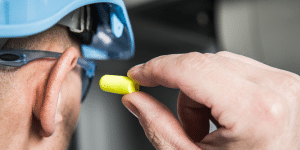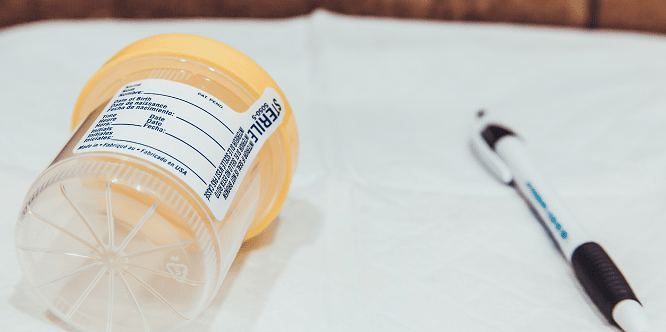TAKEAWAY: Drug testing specimen procedures are critical to ensuring fair and reliable results. Here are the answers to your questions regarding our urine specimen collection and dilution protocols.
Jump Ahead
What is dilution?
Dilution occurs when a urine sample is diluted by the addition of large amounts of fluid, most often by someone attempting to affect the outcome of the test. However, it can also be caused accidentally by drinking large quantities of water or certain medications or illnesses. Laboratories leverage a substance called creatinine to measure dilution. If a sample lacks sufficient creatinine, it is considered diluted.
What are creatinine and specific gravity?
Creatinine is a by-product created by the normal breakdown of muscle tissue and is excreted in the urine in constant quantities with average liquid intake. Excessive liquid intake or dilution reduces a drug’s concentration in the urine. However, it will also reduce the amount of creatinine, so urine samples used in drug-abuse testing are also tested for creatinine. If the concentration is below 20 mg creatinine/dl urine, the urine sample is usually rejected for drug testing.
When technicians find low creatinine levels in a sample, the lab will conduct another test known as specific gravity to confirm the results. This test compares the density of a urine sample to water, which has a specific gravity of 1.000. The lab will deem samples with a specific gravity of 1.005 to1.030 and low creatinine either negative dilute or positive dilute.
Why is dilution a problem?
Positive dilute results mean that the worker tested positive for an illegal substance regardless of the dilution. A negative dilute, however, could mean that either there are no illicit substances present or the specimen was too diluted to permit detection. These outcomes pose a problem for employers who must either confirm or accept the results. This is where Medical Review Officers (MRO) can offer guidance. Dilution is a severe issue for employers because diluted samples make it more challenging to confirm that a person is using illegal drugs.
Although a negative dilute test result alone cannot be used as grounds to reject applicants or action against existing employees, it does mean another test is warranted. Most of the time, employers require a second test following a negative dilute test. This suspends the delivery of results and can further stall hiring decisions or delay the delivery of critical help to employees who need it.
What protocols does SureHire have in place to capture dilution?
SureHire utilizes rapid specimen validity tests, which are semi-quantitative, colour comparison screens for the detection of creatinine and specific gravity within urine specimens. This assessment is a preliminary screen only. A more specific alternate chemical method must be used to obtain a confirmed analytical result at a Health and Human Services-certified laboratory.
The participant is placed on a Dilution Log if a urine specimen is flagged as dilute at the collection site. Collection technicians will then ask the participant to produce additional specimens every 15–20 minutes to flush the excess water out of their system. The participant is given one (1) hour to provide an acceptable specimen before the test is deemed incomplete, and a re-test is required.

Book an Appointment Today!
If you’re looking for a trusted provider to help you navigate the drug and alcohol testing process, contact a member of our team today!
How can testing participants prevent dilution?
SureHire recommends that testing participants restrict their fluid intake two hours before their appointment and limit their fluid intake 24 hours prior to their appointment. This will ensure their specimen concentration is within normal limits and prevent them from having to participate in the one-hour dilution log process.
What should employers do if they receive a negative-dilute result?
While SureHire’s dilution protocols prevent the occurrence of negative-dilute test results the vast majority of the time, there are limitations to the collection site specimen validity tests, and negative-dilute test results may still occur. If an employer receives a laboratory-confirmed negative-dilute test result, SureHire strongly recommends that a re-test be conducted to ensure test result validity.
You May Also Be Interested In…
- Do You Have Reasonable Suspicion?
 Employers cannot initiate reasonable suspicion testing without first going through the 5-step process. Reasonable suspicion training provides critical information about how to initiate reasonable suspicion testing, including the 5-step process and other tools that employers can use to help manage the misuse of alcohol and drugs in the workplace.
Employers cannot initiate reasonable suspicion testing without first going through the 5-step process. Reasonable suspicion training provides critical information about how to initiate reasonable suspicion testing, including the 5-step process and other tools that employers can use to help manage the misuse of alcohol and drugs in the workplace. - An Employer’s Guide: What You and Your Employees Need to Know About DOT Drug & Alcohol Testing
 When implementing or maintaining DOT Drug & Alcohol testing, there are key areas that employers should consider.
When implementing or maintaining DOT Drug & Alcohol testing, there are key areas that employers should consider. - SureHire Occupational Testing Acquires COHR Health: A Positive Step Towards Safe, Healthy, Productive Workforces and Communities
 We are thrilled to announce that today, May 6, 2024, SureHire Occupational Testing has officially acquired COHR Health, a well-known leader in occupational health services. Read on…
We are thrilled to announce that today, May 6, 2024, SureHire Occupational Testing has officially acquired COHR Health, a well-known leader in occupational health services. Read on… - Occupational Testing Use Case – Mining
 In this case study, we will explore how mining companies can use various types of occupational tests to reduce Total Recordable Incident Rates (TRIR) long term.
In this case study, we will explore how mining companies can use various types of occupational tests to reduce Total Recordable Incident Rates (TRIR) long term. - 9 Strategies to Keep Workers Cool on Drilling Sites During Hot Summer Months
 This article delves into strategies to keep workers cool and safe on drilling sites during the hot summer months.
This article delves into strategies to keep workers cool and safe on drilling sites during the hot summer months. - Hearing Conservation Basics: How to Manage Occupational Noise
 Learn how to proactively mitigate occupational noise risks and help prevent NIHL among workers.
Learn how to proactively mitigate occupational noise risks and help prevent NIHL among workers.

